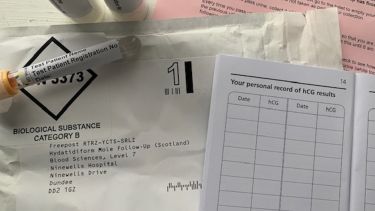Practices of Gestational Trophoblastic Disease
Experiences of Gestational Trophoblastic Disease: Reconciling cancer, pregnancy and loss

Experiences of Gestational Trophoblastic Disease: Reconciling cancer, pregnancy and loss
Dr Emily Ross
Gestational trophoblastic diseases (GTD) are conditions that occur following conception. They result from faulty placental cells. Like healthy pregnancy tissues these grow rapidly, but unfortunately can become invasive. Sometimes these conditions require chemotherapy treatment. GTD produces placental tissues and thus hormones such as hCG. It can be experienced by patients as a healthy pregnancy, and initially medically managed as such. In this research, I consider the sociocultural framings of pregnancy that contribute to GTD being experienced in this way. I also ask how societal understandings of pregnancy, which centre a future baby, shape practices of GTD care. In so doing I hope to centre diverse elements of pregnancy, including the bodily, hormonal, emotional and relational, beyond the foetal subject.
GTD is rare, and within the UK has specialist centres with their own diagnostic practices, laboratories and specialist staff, usually located within oncology. I will consider how this condition has come to be diagnosed and treated in this way, and how patients experience shifts in their care from reproductive health to oncology. What can the organisation of GTD management tell us about societal understandings of cancer as a disease and about the classification of cancer within medical work?
This project will take place from 2020-2024. It involves qualitative interviews, observations, and analysis of online accounts of GTD. Through public engagement work, workshops and presentations I hope to raise awareness of this condition, and of the enduring framings of pregnancy that shape patient experiences of GTD and pregnancy loss more widely.

iHuman
How we understand being ‘human’ differs between disciplines and has changed radically over time. We are living in an age marked by rapid growth in knowledge about the human body and brain, and new technologies with the potential to change them.
